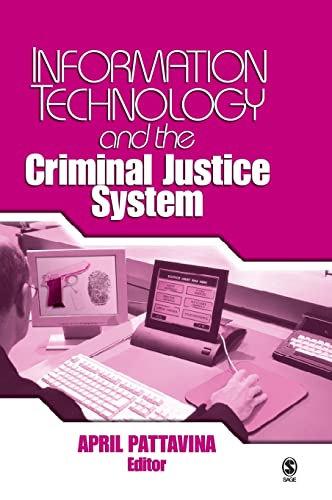Information Technology and the Criminal Justice System
April Pattavina, PhD is an Assistant Professor in the Department of Criminal Justice at the University of Massachusetts at Lowell. Her interests include the impact of information technology on the criminal justice system and applying spatial analysis techniques to the study of crime. In addition to this book, she has published several journal articles in the area of information technology and geographic information systems in particular. One of her most recent articles is Linking Offender Residence Probability Surfaces to a Specific Incident Location: An Application for Tracking Temporal Shifts in Journey to Crime Relationships and Prioritizing Suspect Lists and Mug Shot Order” in (with Richard Gore).forthcoming in Police Quarterly. She is also works extensively with criminal justice agencies. Currently she is principal investigator on a Department of Justice funded grant to integrate criminal justice information related to incidents of domestic violence in a local police department. ... Read more Read less
How has information technology changed the way we monitor criminal behavior? How has it changed the way we examine patterns of criminal behavior? How have criminal justice organizations adapted to using information technology? What is the future of information in criminal justice? There have been many technical, analytical, legal, and organizational issues related to advances in computer and information technology over the past several decades. Given the substantial investments that federal, state, and local criminal justice agencies are making in information technology, they now consider it an integral component of understanding how our criminal justice system works. Information Technology and the Criminal Justice System suggests that information technology in criminal justice will continue to challenge us to think about how we turn information into knowledge, who can use that knowledge, and for what purposes. In this text, editor April Pattavina synthesizes the growing body of research in information technology and criminal justice. Contributors examine what has been learned from past experiences, what the current state of IT is in various components of the criminal justice system, and what challenges lie ahead. Key Features Covers a broad array of topics, including IT development and applications in organizations, data quality issues, legal issues, and criminal justice education Spans a variety of criminal justice agencies including courts, police, and corrections Includes contributors renowned in the field of criminal justice information systems Incorporates case studies to enhance students' understanding of real-life situations Information Technology and the Criminal Justice System is recommended for upper level undergraduate and graduate level courses in Criminal Justice departments, including Information Technology and Criminal Justice; Criminal Justice Data Analysis; Crime Analysis; Technology and Criminal Justice; and Technology and Society. This book is also an excellent resource for professionals in the field. ... Read more Read less











